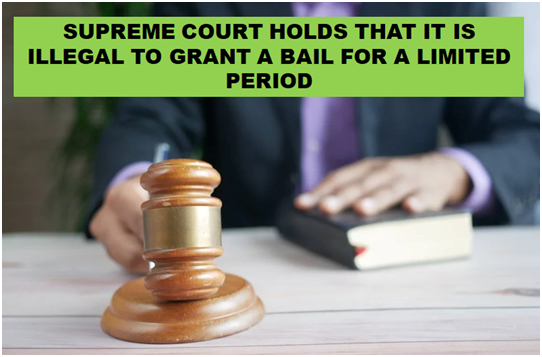SUPREME COURT HOLDS THAT IT IS ILLEGAL TO GRANT A BAIL FOR A LIMITED PERIOD
A two Judge Bench of the Supreme Court, comprising of Justices Abhay S. Oka and Pankaj Mithal, passed a judgement dated 29.11.2023 in Manoranjan Rout V. State of Odisha[1] where the Bench held that once a Court concludes that a person is entitled to bail, granting bail for limited period is illegal. The Apex Court was deciding an Appeal against the final judgement and Order dated 11.08.2023 in BLAPL No. 7558/2023 passed by the High Court of Orissa at Cuttack.
Facts:
The Appellant was being prosecuted for the offence punishable under Sections 20(b)(ii)(c) (Punishment for contravention in relation to cannabis plant and cannabis), Section 25 (Punishment for allowing premises, etc., to be used for commission of an offence) and Section 29 (Punishment for abetment and criminal conspiracy) of the Narcotic Drugs and Psychotropic Substances Act, 1985 (NDPS ACT). Section 20(b)(ii)(C) deals with offenses related to the production, manufacture, possession, sale, purchase, transport, warehousing, use, consumption, import inter-state, export inter-state, import into India, and export from India of narcotic drugs and psychotropic substances. The Act distinguishes between small quantities meant for personal use and commercial quantities associated with trafficking or illegal trade. Section 29 deals with the abetment and criminal conspiracy in relation to offenses under the NDPS Act.
The Appellant was arrested by the local police under custody from 19.04.2021. The case was pending in the Trial Court and only 5 witnesses were examined out of a total number of 25. The Appellant moved a bail application to High Court of Orissa under section 439 of Code of Criminal Procedure (Special powers of High Court or Court of Session regarding bail).
The High Court of Orissa as per the Order dated 05.09.2022, denied the bail to the Appellant but asked the Trial Court to dispose of the case within 6 months and if the said order was not complied with then the Appellant was at the liberty to renew his prayer for bail. However, no progress was made in the trial.
The High Court took into consideration the fact that the Appellant was in prolonged incarceration without disposal of the case despite the directions given for completing the proceedings within 6 months. Hence the High Court rejected the regular bail of the Appellant and granted an interim bail for just 45 days. The Court also mentioned that once the period of 45 days was over, the Appellant must surrender himself to custody and if he fails to surrender, Non-Bailable Warrants (NBWs) will be issued against him. After granting the interim bail, Court disposed of the bail application.
Issues:
(1) Whether imposing a time bound bail is violative of fundamental rights?
(2) Whether the decision of the High Court was valid in granting the interim bail for 45 days?
Decision by the Supreme Court:
The Apex Court expressed concern with the Orissa High Court’s approach and cited multiple cases in which the High Court granted interim or short-term bail orders for Appellant/individuals even if they were entitled to bail. Further delving into the pattern of such orders, the Supreme Court Bench remarked-
“We may note here that this is the fifth or sixth order which we came across from the same High Court where, after recording a finding that an accused was entitled to be enlarged on bail, the High Court has chosen to grant either interim bail or bail for a short duration.”[2]
The Supreme Court stated that if interim bail was to be given, the bail application ought to have been kept pending. This was to avoid any undue restriction on an individual’s right to liberty and to ensure that bail orders aren’t arbitrarily time-bound.
The Supreme Court relied on Article 21 of the Indian Constitution, which protects the right to life and personal liberty, and provided that it includes the ability to be freed, unless there is legitimate justification for detention of the Appellant/Accused. The verdict also builds upon established judicial precedents, emphasizing that any constraints or limitations on the duration of a bail order, after a Court determines the Appellant’s entitlement to bail, would violate Constitutional Rights and create unnecessary legal complexities for the litigants.
Hence, the Supreme Court modified the impugned Order dated 11.08.2023 passed by the High Court and granted bail to the Appellant till the disposal of the case in Trial Court. The judgement focused on the delicate balance between safeguarding an individual’s liberty and ensuring compliance with the legal framework concerning the right of bail.
Arjav Jain
Associate
The Indian Lawyer and Allied Services
[1] S.L.P.(Crl.) No.12205 of 2023
[2] https://main.sci.gov.in/supremecourt/2023/38830/38830_2023_8_6_48692_Order_29-Nov-2023.pdf





































Leave a Reply